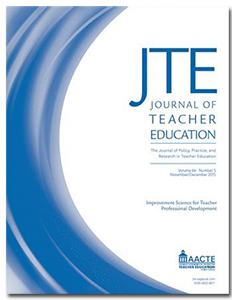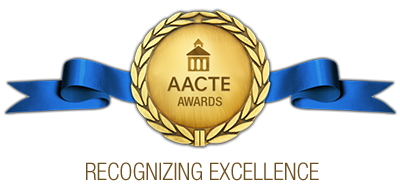14 Sep2016
By Dustin Wunderlich
The following article is reposted with permission from the University of Washington College of Education website. The views expressed in this article do not necessarily represent the views of AACTE.
As some advocacy groups push to deregulate the preparation of teachers and expand independent, alternative routes into teaching, a new policy brief authored by the University of Washington College of Education’s Ken Zeichner reviews what is known about the quality of five of the most prominent independent teacher education programs in the United States.
12 Sep2016
By Kristin McCabe
Mark your calendar for a special webinar September 29 about key roles for educator preparation providers (EPPs) in solving the nation’s persistent teacher shortages.
Offered by AACTE in partnership with the Learning Policy Institute (LPI), the webinar will highlight the latest enrollment and staffing data and promising models for programs and policies to improve educator recruitment, preparation, and retention.
06 Sep2016
By Gail Richmond

The editors of the Journal of Teacher Education (JTE) invite manuscripts for a special issue on historical and contemporary issues in teacher education. Manuscripts are due February 1, 2017, and the editors anticipate that the issue will be published later that year.
As is the case in many other fields, historical events and issues in education have the potential to inform contemporary ones, and it is clear that the field would benefit from attention to the connections between the past and present.
01 Sep2016
By Zachary VanHouten
A new report from the National Council on Teacher Quality (NCTQ) and the Brookings Institution explores the teacher diversity shortages that persist throughout the United States. To illustrate the current imbalance between teacher and student demographics, the report notes that in order to reach uniformity between the two populations, some 1 million White teachers currently in the profession would need to be replaced with approximately 300,000 African American teachers and over 600,000 Hispanic teachers.
Pointing to problems that exist throughout the teacher pipeline, the authors predict that resolving the imbalance in teacher demographics will continue to be challenging. As the nation’s diversity continues to grow, so too will the pressure and struggle to address teacher workforce diversity, they say, requiring a long-term approach to improving it.
30 Aug2016
By Kristin McCabe
If it’s back-to-school time, it’s time for the annual Phi Delta Kappa (PDK) International Poll of the Public’s Attitudes Toward the Public Schools. The findings released today, in this 48th year of the survey, show views that are consistent with prior years in many areas and reveal ambivalence about the primary purpose of public education.
As usual, most of the 1,221 adults (especially parents) who participated in the telephone interviews say they like their local public schools, in general, but are less positive about schools elsewhere and about their own schools’ performance in specific areas, ranging from academic rigor to development of students’ critical thinking and teamwork skills. Respondents are notably divided about the chief goals of public education, the degree of freedom that charter schools should have, and the appropriate balance between technology-based and traditional teaching.
30 Aug2016
By Aaron Goldstein
At the recent National Conference of State Legislatures (NCSL) Legislative Summit, the organization’s International Education Study Group released the report No Time to Lose: How to Build a World-Class Education System State by State. This report culminates a 2-year study by a bipartisan group of state legislators and legislative staff examining the highest performing countries on the Programme for International Student Assessment (PISA) to discover common themes across their policies and practices.
16 Aug2016
By Rodrick Lucero
Are your teacher candidates prepared to work with LGBTQ students? We’d like to learn about your perspectives and practices in our joint survey with the Gay, Lesbian, and Straight Education Network (GLSEN) and the Association of Teacher Educators (ATE), which closes September 15.
In educator preparation, we continually strive to prepare teachers to be more inclusive of and responsive to the range of human diversity their students bring. To help inform this work, it’s useful to survey the field periodically to monitor trends in practice and define a course for moving forward.
15 Aug2016
By Kristin McCabe
In a new report issued August 10, the National Commission on Teaching and America’s Future (NCTAF) calls for reorganizing schools to better cultivate deep learning for all students. The report, What Matters Now: A New Compact for Teaching and Learning, lays out an ambitious vision for educator-driven improvements buttressed by a coordinated system of policy and community supports.
15 Aug2016
By Terrance McNeil
 Congratulations to August Holmes Scholar of the Month Ileana Cortes-Santiago of Purdue University (IN)!
Congratulations to August Holmes Scholar of the Month Ileana Cortes-Santiago of Purdue University (IN)!
Cortes-Santiago’s research interests include Latino/a family literacies and engagement, English language learning, multicultural education, and community-based research. Her commitment to being a change agent in the field of education is evident not only by her scholarship, but in practical application.
09 Aug2016
By JTE Insider
Have you seen the JTE Insider blog managed by the Journal of Teacher Education editorial team? Check out the latest entry below.
In this author interview, Meghan Barnes discusses her article with Peter Smagorinsky, “What English/Language Arts Teacher Candidates Learn During Coursework and Practica: A Study of Three Teacher Education Programs.” Their piece will be published in the September/October issue of JTE, but you can read it now via OnlineFirst.
09 Aug2016
By Kristin McCabe
 Time is running out to apply for AACTE’s 2017 Outstanding Dissertation Award! Entries must be made online by Tuesday, August 16. Help AACTE showcase outstanding doctoral research at your institution by encouraging your top recent graduates (or recent hires!) to apply for this prestigious award, which includes a $1,000 cash prize.
Time is running out to apply for AACTE’s 2017 Outstanding Dissertation Award! Entries must be made online by Tuesday, August 16. Help AACTE showcase outstanding doctoral research at your institution by encouraging your top recent graduates (or recent hires!) to apply for this prestigious award, which includes a $1,000 cash prize.
The Committee on Research and Dissemination will review submissions this fall, and applicants will learn of their status in November (although the announcement of the winner is embargoed until February). The winner then will join other award recipients for special recognition at AACTE’s 69th Annual Meeting in Tampa, Florida, March 2-4, 2017.
04 Aug2016
By Kathryn Opatick and Amanda Lester
 AACTE is excited to announce a call for new submissions to the Innovations Inventory! Online submissions will be accepted now through September 23.
AACTE is excited to announce a call for new submissions to the Innovations Inventory! Online submissions will be accepted now through September 23.
The Innovations Inventory is an online repository of successful programs and initiatives that are improving educator preparation at AACTE member institutions. By documenting successful innovations, the inventory aims to inspire and support advances in educator preparation based on proven approaches that will benefit the field broadly. Members and their PK-12 partners are invited to submit examples of unique or new approaches to educator preparation programs or initiatives that address critical issues in educator preparation and show evidence of positive impact.
In this year’s call for submissions, we are pleased to offer two pathways through which faculty and partners can share their innovative programs:
26 Jul2016
By Yupin Bae and Michelle Kotek
Editor’s note: This is the last blog in our series exploring data on program entry and exit requirements from the 2014 federal collection mandated by Title II of the Higher Education Act. The data include 1,497 providers of “traditional” programs based in institutions of higher education (IHEs), 472 providers of IHE-based alternative programs, and 201 providers of non-IHE-based alternative programs.
Despite the questionable validity of using students’ grade-point averages (GPAs) to predict their future success on the job as classroom teachers, GPA is one of the most common requirements for admission to and graduation from many colleges and professional schools.
26 Jul2016
By Abigail Mercadante and Kristin McCabe
The latest report from the National Center on Education and the Economy (NCEE) Center for International Education Benchmarking analyzes how four high-performing systems around the world develop elementary teachers with deep content and pedagogical understanding. An accompanying policy brief makes a case for employing these practices in order to strengthen primary education, setting students up for success in high school and beyond.
25 Jul2016
By Mia Hines, Dominique Battle-Lawson, Ann Traynor, Mark Kohan, Rene Roselle and Dorothea Anagnostopoulos
The views expressed in this post do not necessarily reflect the views of AACTE.
Like other programs, our teacher preparation program at the University of Connecticut Neag School of Education has long struggled to recruit as many students of color as we’d like. That’s why we joined AACTE’s networked improvement community (NIC) in 2014 to collaborate with other institutions on strategies to bring more Black and Latino men into our programs. Already, we have nearly doubled the percentage of students of color in our program, going from roughly 12% of students to 20% of our entering cohort this fall.








 Congratulations to August Holmes Scholar of the Month Ileana Cortes-Santiago of Purdue University (IN)!
Congratulations to August Holmes Scholar of the Month Ileana Cortes-Santiago of Purdue University (IN)! Time is running out to apply for AACTE’s 2017 Outstanding Dissertation Award! Entries must be made online by Tuesday, August 16. Help AACTE showcase outstanding doctoral research at your institution by encouraging your top recent graduates (or recent hires!) to apply for this prestigious award, which includes a $1,000 cash prize.
Time is running out to apply for AACTE’s 2017 Outstanding Dissertation Award! Entries must be made online by Tuesday, August 16. Help AACTE showcase outstanding doctoral research at your institution by encouraging your top recent graduates (or recent hires!) to apply for this prestigious award, which includes a $1,000 cash prize. AACTE is excited to announce a call for new submissions to the
AACTE is excited to announce a call for new submissions to the